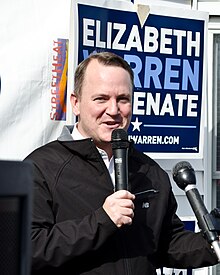Tim Murray
| Tim Murray | |
|---|---|

Murray speaking at an event for Elizabeth Warren
|
|
| 71st Lieutenant Governor of Massachusetts | |
|
In office January 4, 2007 – June 2, 2013 |
|
| Governor | Deval Patrick |
| Preceded by | Kerry Healey |
| Succeeded by | Karyn Polito |
| Mayor of Worcester | |
|
In office 2002–2007 |
|
| Preceded by | Raymond Mariano |
| Succeeded by | Konstantina Lukes |
| Member of the Worcester City Council | |
|
In office 1998–2001 |
|
| Personal details | |
| Born |
Timothy Patrick Murray June 7, 1968 Worcester, Massachusetts, U.S. |
| Political party | Democratic |
| Spouse(s) | Tammy Sullivan |
| Children | Helen Sullivan, Katerine Sullivan |
| Alma mater |
Fordham University Western New England College |
| Profession | Teacher, Lawyer |
Timothy Patrick "Tim" Murray (born June 7, 1968) is an American politician and member of the Democratic Party who served as the 71st Lieutenant Governor of Massachusetts from 2007 to 2013, when he resigned to become the head of the Worcester Chamber of Commerce. Murray previously served on the Worcester City Council from 1998 to 2001 and as the Mayor of Worcester from 2002 to 2007.
Murray was born and raised in Worcester. His father taught high school and his mother worked as a nurse. He attended Worcester public elementary schools, and later went to St. John’s High School in Shrewsbury.
Murray earned his bachelor’s degree at Fordham University. While at Fordham, Murray served as an aide to Bronx Borough President, Fernando Ferrer. He put himself through law school attending classes at night while working days as a substitute school teacher, earning his law degree from the Western New England College School of Law.
In 1997, Murray was elected to serve on the Worcester City Council.
He was elected mayor of the city in 2001, a position he held up until 2007 when he was inaugurated as Lieutenant Governor of Massachusetts. In Worcester, which has a hybrid council/city manager form of government, the mayor is directly elected by the people and is considered the political leader of the city. The mayor is, by charter, chair of the City Council and chair of the School Committee, overseeing the city's 23,000-student public school system. The mayor appoints the membership of City Council committees and directs the council's meetings. The mayor is not the chief executive of the city; that power rests with the city manager, who is appointed by the City Council.
As mayor, Murray promoted brownfields redevelopment, expanded commuter rail service and economic development. Through public advocacy, he helped to launch the largest downtown redevelopment project in the city’s recent history, known as the City Square project, which involved redevelopment of a failed shopping mall on some 20 prime acres in the core of downtown Worcester. When first permitted, the City Square project was the single largest development project in Massachusetts history outside of Boston, but the $1.1 billion proposed downtown center in Quincy may surpass City Square if it is built as planned.
...
Wikipedia
